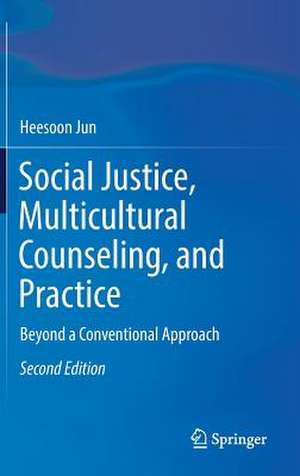Social Justice, Multicultural Counseling, and Practice : Beyond a Conventional Approach
Autor Heesoon Junen Limba Engleză Hardback – 19 mar 2018
This second edition book provides an update to multicultural psychology and counseling research findings, and the DSM-5 in sociopolitical and cultural contexts. It links social psychology with current cognitive science research on implicit learning, ethnocentrism (attribution error, in-group favoritism, and asymmetric perception), automatic information processing, and inappropriate generalization. Chapters discuss the interwoven characteristics of multiple identities of individuals such as race, gender, class, disability, age, religion, region, and sexual orientation. In addition, the book offers concrete strategies to facilitate inner-dialogue and discussion of self-perception and interpersonal relationships.
Featured topics in this book include:
- Intrapersonal communication and the biases that can be involved.
- The impact of a provider’s personal values and beliefs on assessing and treating clients.
- The Social Categorization Theory of Race.
- The Social Categorization Theory of Gender.
- The Social Dominance Theory of Class.
- Identity Construction, Multiple Identities, and their intersectionality.
Social Justice, Multicultural Counseling, and Practice, Second Edition will be of interest to researchers and professors in clinical psychology, counseling psychology, multicultural psychology, social psychology, cognitive neuroscience, social work, social justice, equity, and inclusion work as well as health care providers.
| Toate formatele și edițiile | Preț | Express |
|---|---|---|
| Paperback (1) | 898.13 lei 6-8 săpt. | |
| Springer International Publishing – 12 ian 2019 | 898.13 lei 6-8 săpt. | |
| Hardback (1) | 1190.22 lei 38-45 zile | |
| Springer International Publishing – 19 mar 2018 | 1190.22 lei 38-45 zile |
Preț: 1190.22 lei
Preț vechi: 1566.08 lei
-24% Nou
Puncte Express: 1785
Preț estimativ în valută:
227.74€ • 237.78$ • 188.49£
227.74€ • 237.78$ • 188.49£
Carte tipărită la comandă
Livrare economică 31 martie-07 aprilie
Preluare comenzi: 021 569.72.76
Specificații
ISBN-13: 9783319725130
ISBN-10: 3319725130
Pagini: 390
Ilustrații: XXI, 444 p.
Dimensiuni: 155 x 235 x 33 mm
Greutate: 8.16 kg
Ediția:2nd ed. 2018
Editura: Springer International Publishing
Colecția Springer
Locul publicării:Cham, Switzerland
ISBN-10: 3319725130
Pagini: 390
Ilustrații: XXI, 444 p.
Dimensiuni: 155 x 235 x 33 mm
Greutate: 8.16 kg
Ediția:2nd ed. 2018
Editura: Springer International Publishing
Colecția Springer
Locul publicării:Cham, Switzerland
Cuprins
Chapter 1. Introduction: Still Partially Visible.- Part I: A Provider's Awareness of Her Own Worldview.- Chapter 2. Intrapersonal Communication (Inner Dialogue or Inner Speech).- Chapter 3. Assessment of a Provider's Values, Beliefs, and Biases.- Part II: A Provider's Awareness of Systemic Oppression/Privilege and Internalized Oppression/Privilege.- Chapter 4. Racism.- Chapter 5. Sexism.- Chapter 6. Cissexism (Genderism or Binarism).- Chapter 7. Heterosexism.- Chapter 8. Classism.- Chapter 9. Disablism/Ableism.- Chapter 10. Other “isms” due to Age, Language, Religion, and Region.- Chapter 11. Theory to Practice: Deconstructing Inappropriate Hierarchical, Dichotomous, and Linear Thinking Styles/Patterns.- Part III: A Provider's Awareness of the Client's Worldview.- Chapter 12. Identity Construction and Multiple Identities.- Chapter 13. Culturally Appropriate Assessment.- Chapter 14. Culturally Appropriate Treatment/Healing.
Notă biografică
Dr. Heesoon Jun was born in Seoul, South Korea and was socialized by a family which valued honor, commitment, religious and intellectual freedom but held implicit bias on race and class. She came to the US as a young adult to study psychology as an undergraduate. There, her sense of self shattered as her status changed from majority to minority, privileged to oppressed, and self-confident to self-doubting student. Dr. Jun’s bicultural and bilingual experiences, being an academician and practitioner, searching for balance between two world-views have been instrumental in emphasizing providers’ awareness of their own cultural values and biases in order to understand clients’ world views; paradigm shifts in thinking (from conventional to holistic); and learning (from conceptual to transformative) cognitive neuroscience and mindfulness practice in order to walk the walk of social justice and multicultural counseling competencies. Dr. Jun has a Master’s degree in clinical psychology from Radford University and a Ph.D. in educational psychology from the University of Washington. Currently, she resides in Washington State where she is a licensed psychologist with a part-time private practice and is a professor of psychology at Evergreen State College.
Textul de pe ultima copertă
This second edition book provides an update to multicultural psychology and counseling research findings, and the DSM-5 in sociopolitical and cultural contexts. It links social psychology with current cognitive science research on implicit learning, ethnocentrism (attribution error, in-group favoritism, and asymmetric perception), automatic information processing, and inappropriate generalization. Chapters discuss the interwoven characteristics of multiple identities of individuals such as race, gender, class, disability, age, religion, region, and sexual orientation. In addition, the book offers concrete strategies to facilitate inner-dialogue and discussion of self-perception and interpersonal relationships.
Featured topics in this book include:
- Intrapersonal communication and the biases that can be involved.
- The impact of a provider’s personal values and beliefs on assessing and treating clients.
- The Social Categorization Theory of Race.
- The Social Categorization Theory of Gender.
- The Social Dominance Theory of Class.
- Identity Construction, Multiple Identities, and their intersectionality.
Social Justice, Multicultural Counseling, and Practice, Second Edition will be of interest to researchers and professors in clinical psychology, counseling psychology, multicultural psychology, social psychology, cognitive neuroscience, social work, social justice, equity, and inclusion work as well as health care providers.
Caracteristici
Provides a comprehensive framework for multicultural counseling competency in the 21st Century
Offers concrete strategies to facilitate inner-dialogue and discussion of self-perception and interpersonal relationships
Discusses the interwoven characteristics of multiple identities of individuals such as race, socio-culture, age, religion, region, and sexual orientation
Offers concrete strategies to facilitate inner-dialogue and discussion of self-perception and interpersonal relationships
Discusses the interwoven characteristics of multiple identities of individuals such as race, socio-culture, age, religion, region, and sexual orientation
